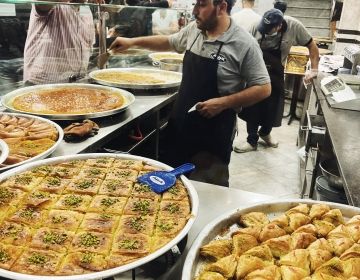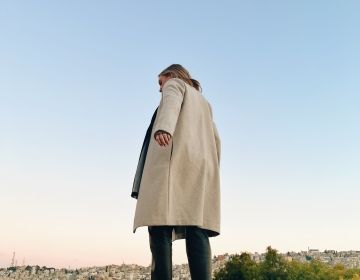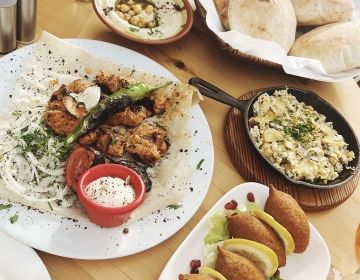SPRING 2017 DIPLOMACY AND POLICY STUDIES PROGRAM ISSUE I

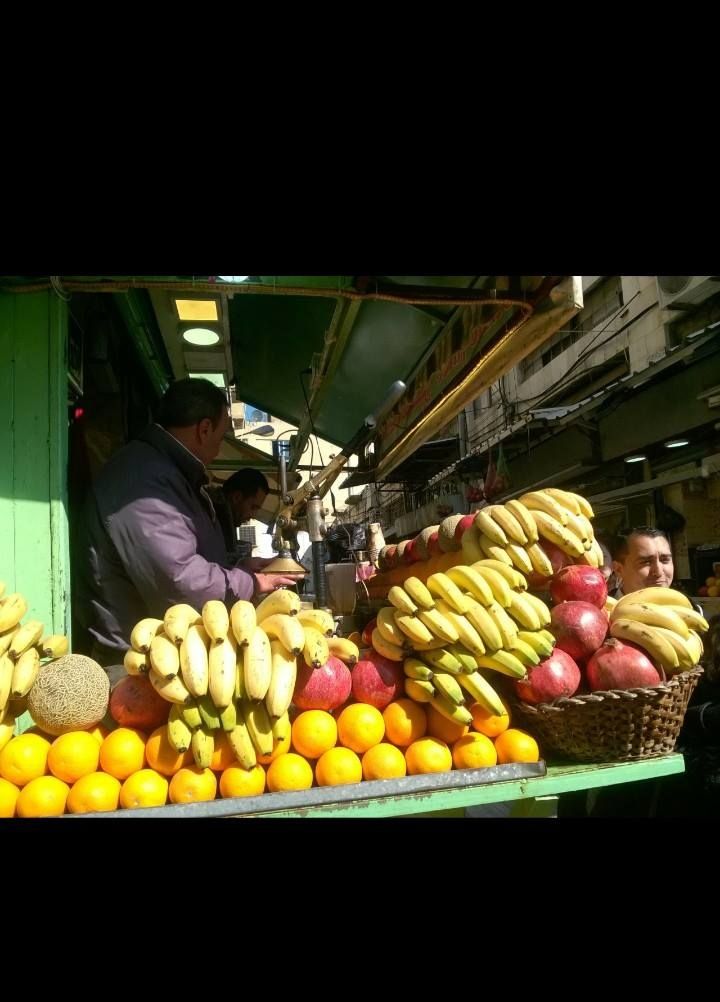
I chose to study abroad in Amman, Jordan because I heard the food was FAN-TASTIC, or in Arabic: Momtaz! Additionally, I had been tailoring my major at UC Berkeley around Middle Eastern politics and conflict resolution. I thought the three semesters of Arabic language and Middle Eastern courses sufficiently prepared me for a semester abroad, but my expectations were surpassed in nearly all respects. The opportunity to immerse myself in this unique culture day after day has transformed my orientalist mentality to a more holistic perspective, as I’ve been able to understand first-hand accounts of street-issues pertaining to daily life here in Amman.
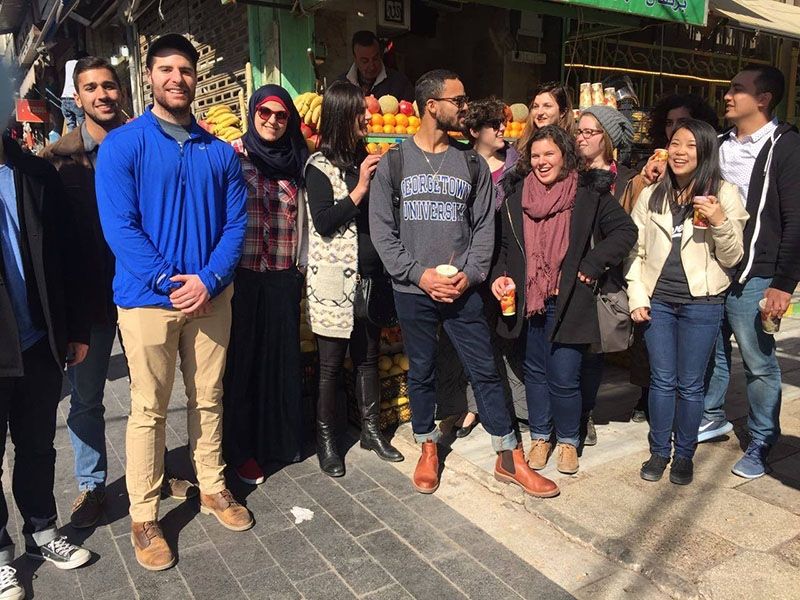
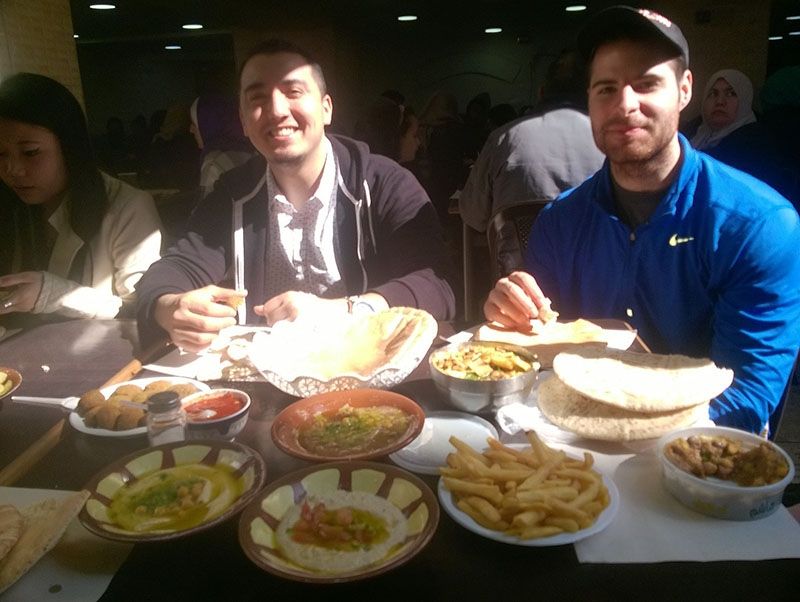
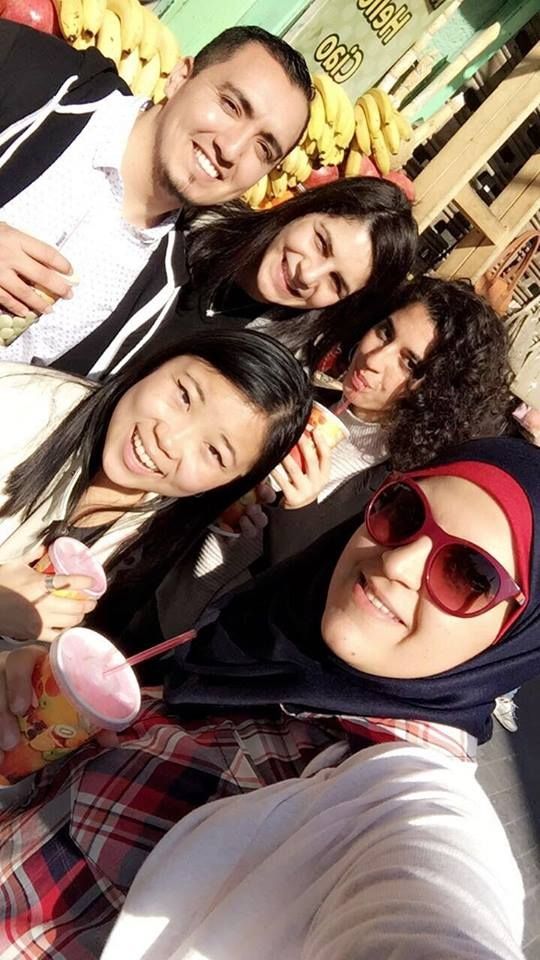
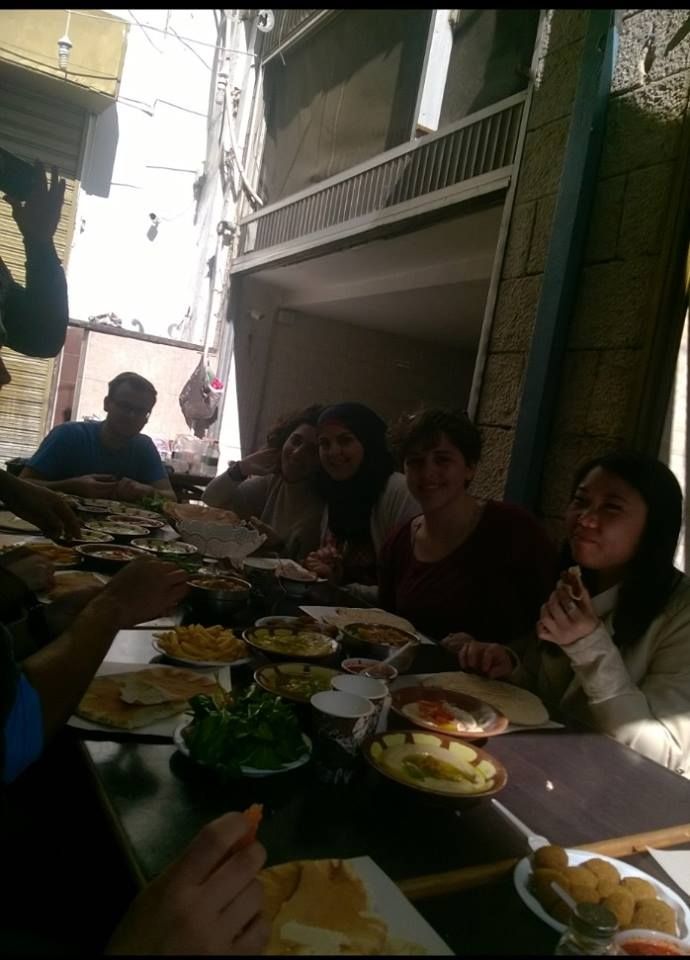
Regardless of their socioeconomic concerns, the people in Amman are always so jubilant and optimistic. This probably has to do with their appetite for delicious food. In my Colloquial Arabic class, we were taken on a field-trip to the downtown area of Amman and ate breakfast in a well-known restaurant called Hasham. This restaurant, frequented by the Jordanian King himself, is famous for its breakfast which was a grand amalgam of Matabal, Hummus, Ful, Falafel, Hadrawat, and fresh Hubz. The food was so tantalizing and the outdoor street setting was perfect to capture and soak in the sunny and vibrant atmosphere. I’m sure I will continue to enjoy the food, the people, and my time here in Amman.
David Gonzales / University of California - EAP
Jordan Experience- Favorite Neighborhood
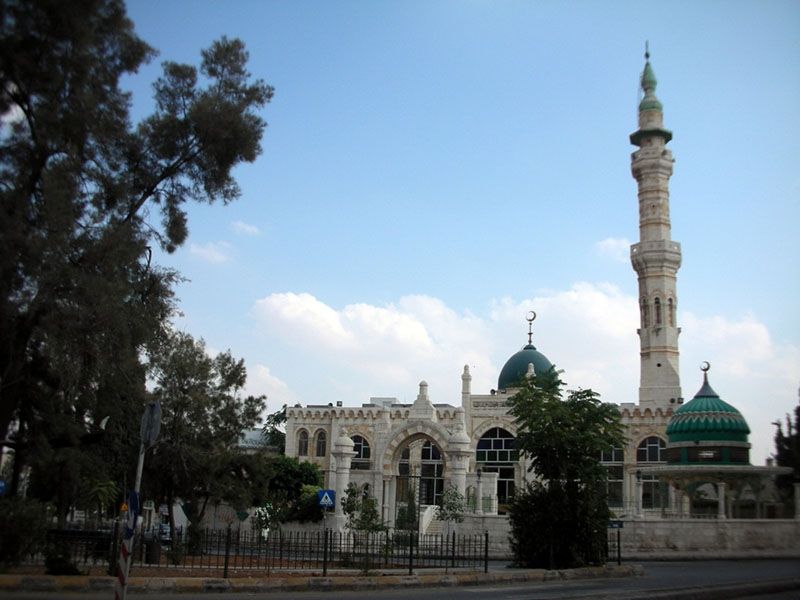
I don’t think I could consider my time in Jordan the same if I had never ventured into Jabal Alluebdah (Webdeh). This neighborhood in Amman sits roughly between Al-Abdali and the beginning of downtown and is no bigger than a handful of long, zig zagging streets. I think I like it so much because most of the streets are one way, so there isn’t a lot of traffic compared to the rest of the city and the usual chorus of car horns is noticeably absent. A new chorus of voices fills the void left by the lack of cars, however. While walking through Webdeh, it is hard not to notice the packed restaurants, quaint cafes, and trendy street art that makes you think “Man, I’d really want that on a tee shirt”. Most (if not all) roads lead to the meeting point of Webdeh, Paris Circle, which is packed with all types of people hanging out, or drinking tea and playing board games. From Paris Circle, you are no more than a few steps away from the wide range of restaurants such as Volk’s Burger, Café Kepi, or Chocohalic (where they have an impressive cup of chili hot chocolate). Most times, it’s great to stroll around Webdeh with a group of friends, but there’s also something extremely relaxing about ducking into a small café to do some work alone, having a few cups of tea and striking up a conversation with the owner. If you’re nice you may even get a cup for free, and if you come back again he’ll even greet you by name and invite you to meet his family. I guarantee it.
Alexander Pollan / Providence College
Dinner with Jordanian Diplomats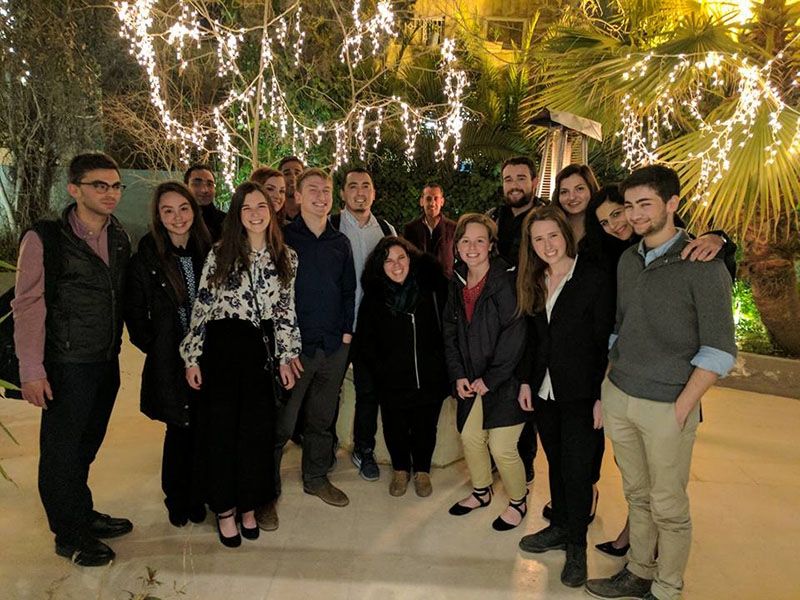
How often does a college student get to call up their mom and say, “Hey, sorry I missed your call, I was having dinner with a couple of diplomats.” Well, that’s exactly what I got to do last week when students from CIEE’s Diplomacy and Policy Studies program were invited to have dinner with two Jordanian diplomats.
We went to NOFA, an art gallery and creative space on Rainbow Street, the only thing better than the cheesecake they served was getting to talk to Omar Ababneh and Ala’a Al Idwan about all things diplomacy. Both gentlemen served in foreign embassies abroad, Omar in South Africa and Ala’a in the Netherlands. They have also held positions in Jordan’s Ministry of Foreign Affairs. As a person who has never considered diplomacy as a possible career path, it was incredibly interesting to hear them discuss the process of becoming a diplomat and what it’s like interacting with officials from other countries. They brought up the fact that diplomats often align with the allegiances of their own country – meaning that if Country A doesn’t have good relations with Country B, those sentiments can trickle down to the personal level between diplomats, as well.
They also raved about the time they spent in New York City. One of the students at the dinner, a New York City native, offered to take them around to see the best places if they were to ever come back, to which both gentlemen chuckled but did not refuse. When asked what the best and worst parts about being a diplomat were, they both answered with the same response: the constant traveling. They went on to explain that if you have a family and a support base in one country, it can be hard to constantly be away from them, especially when assignments come very suddenly as they often do.
In my opinion, one of the most important questions of the night was whether or not diplomats feel that they can affect change. From there the conversation sprung from the participation of Jordanians within foreign affairs to the characteristics of US diplomats to the biggest mistake that Omar and Ala’a have experienced in their time as diplomats. All of this over a traditional Jordanian meal made the evening extremely enjoyable.
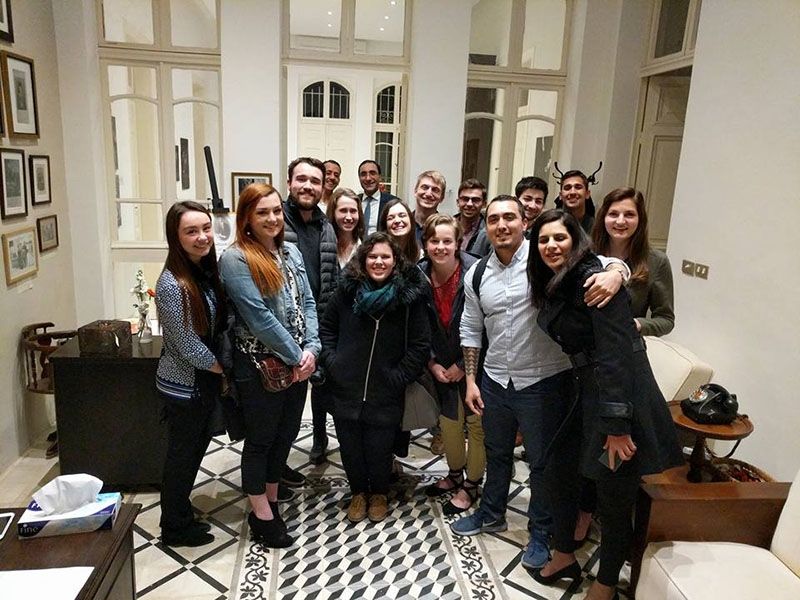
Overall, I think this dinner was one of the coolest parts about my study abroad so far, and I look forward to many more opportunities like this to come.
Devin Rudisill / George Washington University
Internship with the Jesuit Refugee Service (JRS)With the increasing news coverage, issues relating to the millions of refugees enter our focus every day. Yet, it's a completely different experience to meet them yourself. I’ve started an internship with the Jesuit Refugee Service (JRS), an international aid organization that supports urban refugees. With JRS, I work with the Home Visits Team to manage the case information and the database. In the future, I also hope to accompany the home visits. Every day, teams of two will visit about five families in their homes in Amman. During each visit, they talk to the families about their stories and hardships, and then record each case back at the office. Additionally, half of our own team are refugees awaiting resettlement themselves.
When I work, I enter every detail of the cases, I have seen a fair deal of the hardships. JRS not only sees families from Syria and Iraq, but also families from Sudan, Somalia, Yemen, and Eritrea. Families of different sizes come in with various health concerns, debts, psychological issues, living situations, and backgrounds. With the help from our office, we can provide monetary aid, referrals to other agencies, and support. Unfortunately, sometimes it’s not enough. We receive hundreds of new cases each day but can only visit a small portion each month.
In the midst of the horrific parts, we are able to do some good. We are able to give out a lot of monetary aid to many families that we have visited and help those that slip through the cracks of other organizations. Overall, I am proud to be a part of this project and support those I can.
Liana Kabins / Case Western Reserve University
Related Posts
Have a Sweet Tooth? Jordan Has You Covered.
Jordanian cuisine is rich and diverse, and the country's desserts are no exception. From sweet and sticky pastries to delicate floral-infused cakes, Jordanian desserts are a must-try for any foodie... keep reading
How to Pack Like a Pro
Studying abroad can be a life-changing experience, but it can also be overwhelming to pack for an extended stay in a foreign country. Here's a packing list for studying abroad... keep reading
Must-Try Cuisine in Amman, Jordan!
Jordanian cuisine is a delicious and unique blend of flavors from the Middle East, North Africa, and the Mediterranean. Here are the five most famous Jordanian dishes that you must... keep reading

